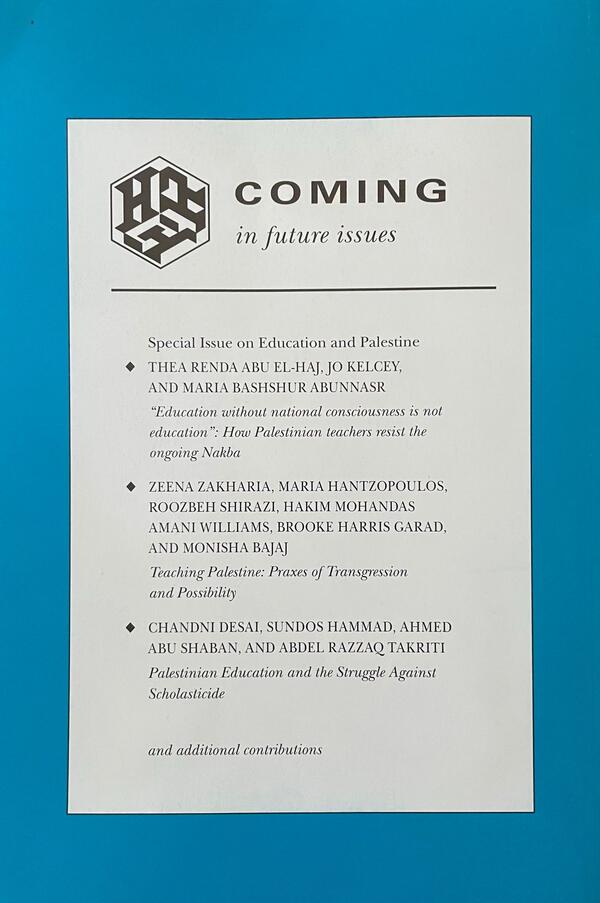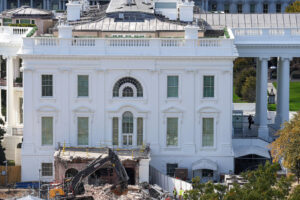
Shocking Cancellation of a Special Journal Issue (opinion)
Rumors are swirling about the extent to which Harvard University will acquiesce to the Trump administration’s attempt to crush institutions of higher education. Until very recently Harvard was being publicly lauded for standing up to the government. Reports that Harvard may be willing to pay a sizable financial settlement to resolve legal accusations that it allowed antisemitism and promoted diversity policies were shocking to many. But the university’s purported resistance to government overreach already had a glaring exception—Palestine—and we as scholars who work on the subject have recently experienced it firsthand.
The Harvard Educational Review was set to release a special issue this summer focusing on education and Palestine. The topic, commissioned in early 2024, was timely in the wake of Israel’s onslaught on Gaza, which rights groups and other experts have concluded is a genocide, and aligned with the journal’s commitment to publishing research that tackles the most pressing issues facing education. The articles had been accepted, edited and contracted. The special issue had already been promoted at major education conferences and on the back cover of the spring issue of the HER. But suddenly, Harvard pulled the plug.
As recently reported in The Guardian, the Harvard Education Publishing Group (HEPG), which publishes the Review, abruptly and unilaterally decided to cancel the forthcoming special issue.
We wrote one of the articles that was supposed to be published in the special issue. Our article, one of 10 slated for publication, focused on the experiences of Palestinian teachers during the Lebanese civil war. But in May, as the special issue was nearing publication, we were surprised to find out that HEPG wanted to submit the entire issue to Harvard’s Office of the General Counsel for an exceptional and last-minute “risk” review. Articles had already been through the regular publishing process and were under contract. At no point to our knowledge had any “risk”-related concerns been raised about any of them. An additional review was therefore well outside the realm of routine practice.
Alarmed by this move and the dangerous precedent of subjecting academic scholarship to vetting by university lawyers, all authors in the special issue organized and expressed unequivocal refusal to this additional review in a letter sent to HEPG.
After we expressed our refusal, HEPG went radio silent for almost a month. And then it canceled the whole issue, only then claiming that there were problems with copyediting and its internal process. But procedural claims have often been leveled to silence speech, especially when it comes to Palestine. Whatever concerns about the process, there is no justification for the cancellation of the entire special issue. HEPG’s decision is yet another example of the “Palestine exception” in action: the term used to describe how seemingly liberal institutions restrict freedom of expression when it comes to Palestine.
Given the timing of HEPG’s decision—which aligns with the Trump administration’s weaponizing of Title VI of the Civil Rights Act—this seems to be the logical outcome of a political climate that has promoted sweeping claims of antisemitism to attack student protesters and higher education institutions, including Harvard. In this climate it seems far more likely that HEPG opted for censorship over academic freedom.
Of particular concern is Harvard’s recent adoption of a problematic new definition of antisemitism. That definition, proposed by the International Holocaust Remembrance Alliance (IHRA), has been roundly criticized by experts—and one of the authors of the definition—for equating critiques of the state of Israel with antisemitism. This conflation makes it harder to speak out against Israel’s actions and policies toward Palestinians and easier to victimize Palestinians. Harvard is not alone in this action.
Even before Israel’s latest brutal onslaught of Gaza, scholars writing and advocating for Palestinian rights confronted the limits of liberal empathy for Palestinians in the form of tenure denials, censored freedom of speech, doxing by pro-Israel groups and even death threats. But the repression of knowledge production and freedom of speech on Palestine has escalated since October 2023. U.S. universities and colleges (including Harvard) have canceled events that center Palestinian rights, attempted to censor scholarship, forcibly suppressed student protests against Israel’s actions in Gaza and beyond, and dismissed faculty over Palestine-related programming.
Still, the scrapping of this special issue marks a worrying escalation. It suggests that even those universities that are outspoken about their liberal values are ready to stifle academics’ legitimate criticism of Israeli policies and practices. Make no mistake: Anticipatory censorship of this kind is a hallmark of the governmental overreach that authoritarian regimes around the world are known for. As a growing number of higher education institutions adopt the IHRA definition of antisemitism, we fear we will see more and more examples of the suppression of academic freedom.
The consequences of this extend far beyond the academy. As the death toll in Gaza exceeds 60,000 and young people there face a third year without education amid ongoing bombardment, blockade and starvation, knowledge, debate and democratic action are essential to preventing the kind of horrors that are unfolding in Gaza today.

Source link



